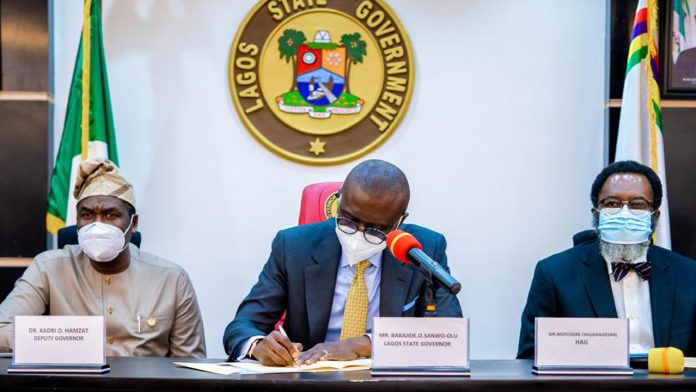The Lagos State House of assembly on 9 September passed an Anti-Open Grazing bill into law, prohibiting open grazing in the state and a bill that provides for Lagos State government to collect value added tax (VAT). Rivers state government had earlier passed a bill into law prohibiting Federal Inland Revenue Services (FIRS) from VAT collection in the state.
We will recall for months now there have been some serious dispute between federal government and some state governments concerning open grazing or not. This contradiction became more sharpened with the unstopping clashes in farming communities and the rise in secessionist agitation. Many in the bosses’ class including some state governors have found comfort in towing the ethnic line to protect themselves and distract the oppressed people in different nationalities from a clear understanding of the bosses in government’s inherent failures. That is not only protecting those governors, rather protecting the oppressive system of capitalism in total.
In July, the southern governors’ forum met in Lagos, among the resolutions they reached is ban on open grazing.
Let it be noted that anti-open grazing law is insufficient to address the continuous killings in poor and farming communities. That is something of a half solution which is a clear indication of the governors unseriousness and it presents more dangers to working people in the poor communities and beyond.
Firstly, we need to grasp the fact that cattle farming business is a huge economic sector owned by wealthy people organized across many nationalities in Nigeria. Open grazing can be explained as a case of state massively subsidizing grazing resources for the bosses just as they have done with incentives to bosses in other sectors of the economy. The regular incentives to the electricity sector after its full deregulation and yet the sector continue to wallow in crisis is a good instance.
But that state subsidy to the big owners of cattle farming business have come with great burdens for the people especially poor farmers in the poor communities. According to a 2019 report, clashes between herders and crop farmers have claimed roughly 7,000 lives over the past five years and cost the Nigerian economy $13 billion annually.
Also, we will recall that there were cattle ranches in Nigeria before they went into oblivion starting from early 1990s. There were about 415-gazetted grazing reserves in the country many set up in the First Republic before they were mismanaged and condemned to ruin. The bosses in government and businesses cannot be excused from the failure of the ranches system back then.
The answer remains for the cattle business to first and foremost be treated like a business. And for the government to be involved and regulate that business (basically a total departure from neoliberalism must apply to all sectors of the nation’s economy). A critical demonstration of that is for the state governors and even federal government to set up state-owned ranches and revamp the old grazing reserves in which herds owners can rent at the appropriate price to be determined by the state. The grazing reserves or ranches must be state-owned as against the Private Public Partnership arrangement being mulled by some state governors including Ogun State governor, Dapo Abiodun.
The reserves workers and people in the host communities where such ranches are shall be involved in the operations of the ranches.
That lies the solution not the half-hearted prescription of the state governors or the recklessness of the federal government. We must equally take note that the RUGA of the federal government is not less a problem than that of the state governors’ prescription. The RUGA is to institutionalize the state subsidy to the bosses.
The VAT situation has been in the similar light. Let it be emphasized that the VAT Act is an attempt to provide a false appeal to those among the masses who subscribe to restructuring. The contradiction on who collects the VAT has been a case of who steals what from the working people. We need to question the very essence of VAT. The value added tax was introduced in 1993 and it is a flat and regressive tax policy.
That bulk of the VAT is being generated in the southern states and that these states get little percent what they generate is a half-truth. It is important to point out that 90% of the VAT is generated on the sweat and blood of popular masses which the recent increment from 5% to 7.5% further put economic burden on the working-class people. In many cases the big bosses are being exempted from taxation with different tax holidays and incentives or outright tax evasion.
What needs to be done and not only in the southern states but across the country, is to effect a progressive tax regime, such that the billionaires and all sections of the bosses class will have to pay appropriate taxes on their ridiculous earnings. Taxation of the bosses and their businesses including cattle breeding will further strengthen the economy and reduce the burden on the working class and poor masses.
Meanwhile the recent reactions of the state governments on the question of cattle grazing and VAT has again demonstrated their resolve to protect their interest at the detriment of lives of the poor masses. What that means for us is to commit to changing the system that empowers the bosses to effect those reactions and consolidate their systemic oppressions. We have to unite across all nationalities to fight the bosses organized in all nationalities also. We must remember and always emphasize that our strength and ability to change the world for better lies in our unity.
by Lai BROWN









